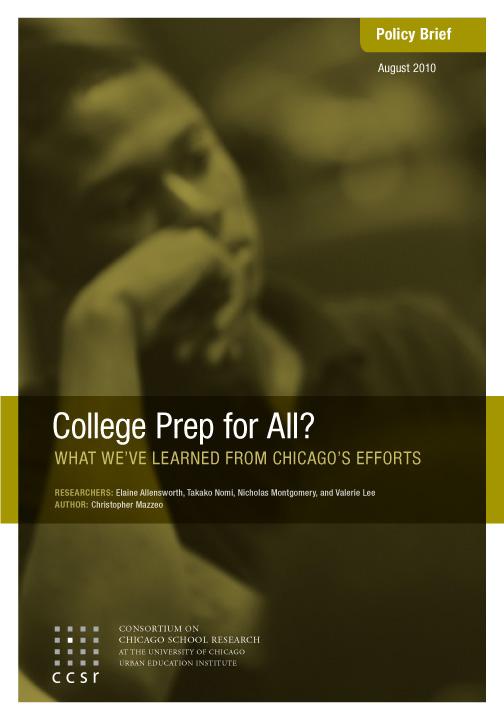CCSR Policy Briefs on "Double Dose" Algebra and College-Prep for All
As states and districts across the country implement college-preparatory curriculum standards for all students, emerging research on a policy implemented in Chicago suggests that the effects of these efforts could be the opposite of those intended. In 1997, Chicago Public Schools (CPS) was ahead of the current national trend, eliminating remedial classes and requiring all high school students to take college-preparatory coursework. But this policy had no positive effects on student achievement and may actually have hurt the college prospects of some top students, according to a new policy brief from the Consortium on Chicago School Research at the University of Chicago.
Double-Dose Algebra
A complementary policy brief explores the effects of requiring students with below-average math skills to take two periods of algebra in a single year. The report, “Are Two Algebra Classes Better Than One? The Effects of Double-Dose Instruction in Chicago,” found that the policy, when paired with additional support for teachers, showed significant promise for improving the academic skills of all students. Because the policy had the unintended consequence of grouping students by ability level, it affected students who were exposed to double-period algebra, as well as those who were not. Therefore, the study has implications both for policymakers searching for ways to improve math skills, as well as those interested in the effects of ability grouping.
Overall Results
Key findings from the two reports include:
- The new mandatory college-prep policy led more CPS freshmen to take college-preparatory classes. By 2004, seven years after the policy was adopted by CPS, virtually all ninth-graders were enrolled in both English I and Algebra I. Gaps in course enrollment by race and ethnicity that existed prior to the 1997 policy largely disappeared afterwards.
- The college-prep mandate had no positive effects on student achievement: Test scores in math and English did not improve for either low- or high-skill students, and reading test scores actually declined for the highest-skilled students; ninth grade math and reading grades declined for low-skill students; failure rates in both subjects increased for low-skill students; and course absences increased in both subjects for high-skill students.
- The mandatory college-prep curriculum had negative effects on graduation rates and college enrollment. The study found that requiring a full four years of college-preparatory curriculum made it more difficult for students to obtain the credits needed to graduate, and high school graduation rates declined slightly. Furthermore, students with strong grades were slightly less likely to go to college after the mandatory college-preparatory policy was implemented. They were also less likely to take a very rigorous science curriculum that included both chemistry and physics, as it became common for all students to simply take the default three-year curriculum in science.
- The "double-dose" algebra policy affected both students who were targeted by the policy and those who were not. Researchers found that low-skill and high-skill students improved their math skills significantly, as evidenced by higher test scores.
- The double-dose policy fell short of its original goal: to reduce failure rates in algebra. Though students’ algebra test scores increased under the policy, course-passing rates did not improve. Moreover, though students learned more, grades fell because courses became more demanding.
